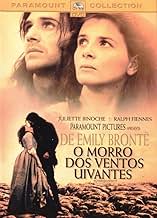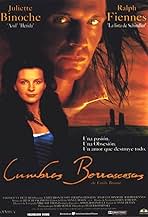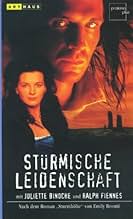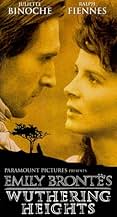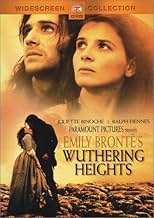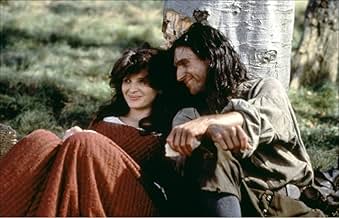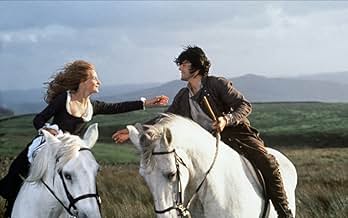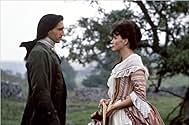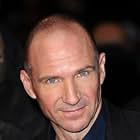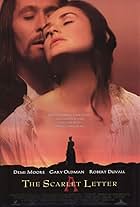A man becomes obsessed with vengeance when his soul mate marries another man.A man becomes obsessed with vengeance when his soul mate marries another man.A man becomes obsessed with vengeance when his soul mate marries another man.
- Awards
- 1 nomination total
- Director
- Writers
- All cast & crew
- Production, box office & more at IMDbPro
Featured reviews
Although I would not suggest this film to anyone who has not read the book first (you would be thoroughly confused and missing out on major details of the plot!) I found Wuthering Heights (1992) to be the ideal visual aid to compliment the tragedy and passion of Heathcliff and Catherine's story. If Emily Bronte were alive, she herself would have cast Ralph Fiennes as Heathcliff (he was born for the role!) and Juliette Binoche was perfect particularly when she showed the more playful and childish sides of Catherine (her laughter was exactly as I had imagined - bright and bold...and just irritating enough that it really would drive Heathcliff - and later, Hareton - to suffer from wounded pride when it was directed at their egos). The beauty of this story is that you never really can decide who is the villain and who is the victim....
As I am a writer, very seldom am I at a loss for words. Yet now, I can find none suitable. I have written many reviews, in many places, for quite a long time. Yet, never, in all of that time have I sat down to write my thoughts immediately after watching a film. Still, I sit here now, trying vainly to describe what I am feeling. What this movie has MADE me feel.
The story of Heathcliff and Cathy is not about love as most know it. It is MORE than love. It is a fusion, a union of two souls separated by society and circumstance, yet bonded so completely that even death could not sever them. Love beyond pain, beyond place, beyond reason.
Never has an adaptation brought this classic Victorian novel so completely to the screen. That, in itself, is high praise. Wuthering Heights had been made 14 times before this, the 1992 incarnation. It is the only version to tell the complete story in all of its dark detail. It is also the LAST time, to date, it has been made. And that should be the highest praise of all.
Why? Because there is no need to do it again. It cannot be improved upon beyond this. Yes, the movie can be a bit confusing, even abrupt in the plot shifts for those who have never read the book. But for those who have: Anne Devlin treats her screenplay with reverence for Emily Bronte's novel. Many whole scenes are intact, the dialog exactly as written originally. The scenery was breathtaking. And the house, the Heights itself, was perfect. Still standing there, after centuries, keeping its own secrets in the silence of its stones.
The cast of actors includes not one single Hollywood darling. Thank God. They would have ruined it. But, because the cast is not overly well known in the US, you concentrate on the PERFORMANCES rather than the performers.
And, it is in these performances this film rises above its predecessors. The actors all turn in solid efforts. Each is true to character, from selfish Cathy (Juliette Binoche) to vapid Isabella (Sophie Ward). Simon Shepherd's Edgar Linton is far more likable than the novel. His portrayal is an improvement on the original, and you actually pity him for being caught between Cathy and Heathcliff.
Heathcliff. An immortal character, like Sherlock Holmes, or Hamlet. Sir Laurence Olivier, arguably the best Hamlet, played Heathcliff in the 1939 version opposite Merle Oberon as Cathy. Until tonight, I thought his was the best Heathcliff, as well. Until tonight.
Tonight I watched Ralph Fiennes play Heathcliff. No, not play. He BECAME Heathcliff. Bronte's Heathcliff. A Heathcliff I had always pictured clearly in my mind, but had NEVER seen before my eyes. Before tonight. This man is RIVETING. He commands the story, seizing it, wrenching it to his will as Heathcliff does the lives of those around him.
Yet, you do not hate him for it. Rather, you ache for him. You look into his eyes and feel every rip in his soul, the agony of every jagged edge in his shattered heart. You watch him wear his cruelty like a mantle, lashing out at a world which denies him the only thing he has ever wanted, the only thing which will make him whole. I cry at movies all the time. Seldom, though, am I torn in a grief so absolute I am left at the end empty, and spent.
I don't know much about Ralph Fiennes work. I tend to like films that deal in anything BUT reality, so have not seen much of him. I loved Red Dragon, but until I read his filmography, I never connected Francis Dolarhyde to Heathcliff, which is perhaps the greatest compliment one can give an actor. Fiennes alone is the reason you cannot improve on this film. No one could ever bring Heathcliff to life like this. The role belongs to him.
I have loved Emily Bronte's novel since childhood. I have read it often. But now, something has changed it for me, forever. No matter how many times I may read Wuthering Heights in future, after tonight, I know I shall never again read it without seeing the face, or hearing the voice, of Ralph Fiennes.
The story of Heathcliff and Cathy is not about love as most know it. It is MORE than love. It is a fusion, a union of two souls separated by society and circumstance, yet bonded so completely that even death could not sever them. Love beyond pain, beyond place, beyond reason.
Never has an adaptation brought this classic Victorian novel so completely to the screen. That, in itself, is high praise. Wuthering Heights had been made 14 times before this, the 1992 incarnation. It is the only version to tell the complete story in all of its dark detail. It is also the LAST time, to date, it has been made. And that should be the highest praise of all.
Why? Because there is no need to do it again. It cannot be improved upon beyond this. Yes, the movie can be a bit confusing, even abrupt in the plot shifts for those who have never read the book. But for those who have: Anne Devlin treats her screenplay with reverence for Emily Bronte's novel. Many whole scenes are intact, the dialog exactly as written originally. The scenery was breathtaking. And the house, the Heights itself, was perfect. Still standing there, after centuries, keeping its own secrets in the silence of its stones.
The cast of actors includes not one single Hollywood darling. Thank God. They would have ruined it. But, because the cast is not overly well known in the US, you concentrate on the PERFORMANCES rather than the performers.
And, it is in these performances this film rises above its predecessors. The actors all turn in solid efforts. Each is true to character, from selfish Cathy (Juliette Binoche) to vapid Isabella (Sophie Ward). Simon Shepherd's Edgar Linton is far more likable than the novel. His portrayal is an improvement on the original, and you actually pity him for being caught between Cathy and Heathcliff.
Heathcliff. An immortal character, like Sherlock Holmes, or Hamlet. Sir Laurence Olivier, arguably the best Hamlet, played Heathcliff in the 1939 version opposite Merle Oberon as Cathy. Until tonight, I thought his was the best Heathcliff, as well. Until tonight.
Tonight I watched Ralph Fiennes play Heathcliff. No, not play. He BECAME Heathcliff. Bronte's Heathcliff. A Heathcliff I had always pictured clearly in my mind, but had NEVER seen before my eyes. Before tonight. This man is RIVETING. He commands the story, seizing it, wrenching it to his will as Heathcliff does the lives of those around him.
Yet, you do not hate him for it. Rather, you ache for him. You look into his eyes and feel every rip in his soul, the agony of every jagged edge in his shattered heart. You watch him wear his cruelty like a mantle, lashing out at a world which denies him the only thing he has ever wanted, the only thing which will make him whole. I cry at movies all the time. Seldom, though, am I torn in a grief so absolute I am left at the end empty, and spent.
I don't know much about Ralph Fiennes work. I tend to like films that deal in anything BUT reality, so have not seen much of him. I loved Red Dragon, but until I read his filmography, I never connected Francis Dolarhyde to Heathcliff, which is perhaps the greatest compliment one can give an actor. Fiennes alone is the reason you cannot improve on this film. No one could ever bring Heathcliff to life like this. The role belongs to him.
I have loved Emily Bronte's novel since childhood. I have read it often. But now, something has changed it for me, forever. No matter how many times I may read Wuthering Heights in future, after tonight, I know I shall never again read it without seeing the face, or hearing the voice, of Ralph Fiennes.
SPOILERS Much has been made of this version of Emily Bronte's novel being the first cinematic version to be really faithful to her book. For once, we see the story continue after Cathy's death, and Heathcliff is shown to be truly villainous. More importantly ,this version gets across the fact that BOTH Heathcliff and Cathy are mean, selfish people who destroy themselves, each other and don't seem bothered about destroying others too. Ralph Fiennes is almost Bronte's character on screen, and skillfully maintains a bit of sympathy for Heathcliff even when he is committing the most dreadful of acts. Visually the film, filmed for once in Yorkshire, is terrific- bleak in an almost beautiful way, and a few scenes, such as the hand of Cathy's ghost in the window, are indeed excellently done.
However the film is seriously flawed by it's odd lack of emotion. There is a stiff, 'Merchant Ivory' feel to the film, completely wrong with a story as full of powerful, destructive emotions such as this. Only one scene, when Heathcliff cradles Cathy's body in her grave, really has any real power. Heathcliff's end and reunion with Cathy should be tearjerking, but is hardly moving at all. The attempt to include more of Bronte's plot is not too successful either, because many important scenes are rushed to keep the running time low. And there are some odd changes which do not work. What is the point of having Emily Bronte at the start and at the end, especially when Lockwood still narrates the main story? Why do Heathcliff and Cathy appear to have a sexual relationship, and right near the beginning? Why have Heathcliff beat up his wife? Yes, he mistreated her but having him as a wife batterer makes no sense, is he not bad enough already?
Still a reasonably worthy attempt than, but, in terms of cinema, the 1939 version is far superior.
However the film is seriously flawed by it's odd lack of emotion. There is a stiff, 'Merchant Ivory' feel to the film, completely wrong with a story as full of powerful, destructive emotions such as this. Only one scene, when Heathcliff cradles Cathy's body in her grave, really has any real power. Heathcliff's end and reunion with Cathy should be tearjerking, but is hardly moving at all. The attempt to include more of Bronte's plot is not too successful either, because many important scenes are rushed to keep the running time low. And there are some odd changes which do not work. What is the point of having Emily Bronte at the start and at the end, especially when Lockwood still narrates the main story? Why do Heathcliff and Cathy appear to have a sexual relationship, and right near the beginning? Why have Heathcliff beat up his wife? Yes, he mistreated her but having him as a wife batterer makes no sense, is he not bad enough already?
Still a reasonably worthy attempt than, but, in terms of cinema, the 1939 version is far superior.
This is an unfairly maligned adaptation. True, if you judge it against more famous adaptations (e.g. the 1939 version), the first half of the film feels inadequate. However if you hold on in there, you'll get the second half of the book, revealing a plethora of themes Emily Bronte was exploring that are non-existent in the other films and revealing the novel's dark cruelty. Why previous adaptors chose to turn the film into a simple love story can be put down to sexism; had it been written by a man, the filmmakers would accept the brutal aspects of the book but of course a Victorian woman could never write such shocking things. For those who only know the story from previous adaptations or the brilliant Kate Bush song, it is a saga of hatred. Being rejected by his childhood love/adopted sister/soulmate Cathy Earnshaw (Juliette Binoche) when she chooses to marry prim Edgar Linton (Simon Shepard). Heathcliff vows vengeance on the Lintons by marrying Edgar's sister Isabella (Sophie Ward) and then also torturing Cathy and Edgar's daughter, Catherine Linton (Juliette Binoche- again!).
The film's mistake is that it is too tentative in the first half. Director Peter Kosminsky still wanted to give viewers the conventional love story that they knew and loved so he made the first half quite gentle in order to mitigate the darker second half. Unfortunately it means that Cathy and Heathcliff's relationship is not tempestuous enough. The famous declarations- "I AM Heathcliff", "I cannot live without my soul"- are spoken quietly and demurely.
Others have mentioned Binoche's excessive giggling, which doesn't convince me that she's seventeen but rather that she's under the influence. The criticisms of her accent is unfair; she has a clear French twang but it's hardly up there in the Hall of Bad Movie Accents. Fiennes' Yorkshire accent is far worse, sounding as if he'd learnt it through watching Postman Pat episodes. His initial niceness is overdone; Heathcliff is a gentle nature-loving soul who we cannot imagine why anyone would be so mean as to beat him as his adoptive brother Hindley (Jeremy Northam) does. Binoche is far too girlish as Cathy, who is essentially a tomboy and whose wild nature makes her identify with Heathcliff.
Things only really get going when Heathcliff returns, allowing Fiennes to drop the awful accent. Kosminsky keeps the novel's framed narrative, with tenant Mr Lockwood arriving at Wuthering Heights and meeting Heathcliff and Cathy II, who he mistakes to be Heathcliff's wife. If you are unfamiliar with the novel, it may be best to locate a family tree as a handy guide. Don't worry though; Emily Bronte meant the family tree to be messy and confusing. That is why I think the double-roling of Binoche as mother and daughter works. It shows how Heathcliff sees Cathy everywhere and adds a perverse sexual tension as well. Binoche is much better as the daughter and Fiennes is stronger as older Heathcliff.
One of the good things about the adaptation is its fidelity to the novel. Using much of the novel's original dialogue, we get a truer picture of Heathcliff's cruelty. It is hard to argue that Heathcliff isn't really that bad when he beats his wife, calls her an 'abject thing' and says she 'degenerates into a mere slut'. Fiennes refreshingly doesn't try to make Heathcliff sympathetic or gloss over his actions; rather he plays a torturer who is tired of tormenting yet unable to stop himself. Heathcliff could have left the second generation alone but instead he punishes them and plays with them like chess pieces.
Whilst I do like the perversely seductive evil of Fiennes' interpretation (his performance here is what got him the role of Amon Goth in Schindler's List), like Olivier he is a little too refined to play early Heathcliff. We can never really buy him as savage; in the book, he is characterised almost like a creature rather than a human. This is why to an extent readers pity him. However Fiennes' Heathcliff is suavely evil.
The inclusion of the second half of the novel is really what recommends this film and why fans of the novel should put it top of their list of adaptations to see. Bronte did not include the main characters' children to be cute or to drag out the story. It gives the story more impact, making the film a saga of one man's bitterness rather than a doomed love story. The film keeps the wonderfully atmospheric ending of the novel and shows through the second generation that the conflict may be resolved and that the things dividing Cathy and Heathcliff will not divide this second generation. Other film adaptations ignore this small ray of optimism and hence the novel is remembered as a big misery fest. First timers to the story may find themselves lost; Wuthering Heights is an odd tale even in the generic film adaptations. The relevance of the second half may not be instantly apparent to them and will certainly be confusing if they come to it with preconceptions of the story. However a re-watch brings new subtleties and nuances that aren't present in the other film adaptations (bar elements of the dreadfully dull 2011 version).
Ironically in order to see the true nature of the story, you have to watch two flawed films (1992 and 2011). One day someone will get it right- hopefully the 1992 film has opened up doors for future films to tackle both generations.
The film's mistake is that it is too tentative in the first half. Director Peter Kosminsky still wanted to give viewers the conventional love story that they knew and loved so he made the first half quite gentle in order to mitigate the darker second half. Unfortunately it means that Cathy and Heathcliff's relationship is not tempestuous enough. The famous declarations- "I AM Heathcliff", "I cannot live without my soul"- are spoken quietly and demurely.
Others have mentioned Binoche's excessive giggling, which doesn't convince me that she's seventeen but rather that she's under the influence. The criticisms of her accent is unfair; she has a clear French twang but it's hardly up there in the Hall of Bad Movie Accents. Fiennes' Yorkshire accent is far worse, sounding as if he'd learnt it through watching Postman Pat episodes. His initial niceness is overdone; Heathcliff is a gentle nature-loving soul who we cannot imagine why anyone would be so mean as to beat him as his adoptive brother Hindley (Jeremy Northam) does. Binoche is far too girlish as Cathy, who is essentially a tomboy and whose wild nature makes her identify with Heathcliff.
Things only really get going when Heathcliff returns, allowing Fiennes to drop the awful accent. Kosminsky keeps the novel's framed narrative, with tenant Mr Lockwood arriving at Wuthering Heights and meeting Heathcliff and Cathy II, who he mistakes to be Heathcliff's wife. If you are unfamiliar with the novel, it may be best to locate a family tree as a handy guide. Don't worry though; Emily Bronte meant the family tree to be messy and confusing. That is why I think the double-roling of Binoche as mother and daughter works. It shows how Heathcliff sees Cathy everywhere and adds a perverse sexual tension as well. Binoche is much better as the daughter and Fiennes is stronger as older Heathcliff.
One of the good things about the adaptation is its fidelity to the novel. Using much of the novel's original dialogue, we get a truer picture of Heathcliff's cruelty. It is hard to argue that Heathcliff isn't really that bad when he beats his wife, calls her an 'abject thing' and says she 'degenerates into a mere slut'. Fiennes refreshingly doesn't try to make Heathcliff sympathetic or gloss over his actions; rather he plays a torturer who is tired of tormenting yet unable to stop himself. Heathcliff could have left the second generation alone but instead he punishes them and plays with them like chess pieces.
Whilst I do like the perversely seductive evil of Fiennes' interpretation (his performance here is what got him the role of Amon Goth in Schindler's List), like Olivier he is a little too refined to play early Heathcliff. We can never really buy him as savage; in the book, he is characterised almost like a creature rather than a human. This is why to an extent readers pity him. However Fiennes' Heathcliff is suavely evil.
The inclusion of the second half of the novel is really what recommends this film and why fans of the novel should put it top of their list of adaptations to see. Bronte did not include the main characters' children to be cute or to drag out the story. It gives the story more impact, making the film a saga of one man's bitterness rather than a doomed love story. The film keeps the wonderfully atmospheric ending of the novel and shows through the second generation that the conflict may be resolved and that the things dividing Cathy and Heathcliff will not divide this second generation. Other film adaptations ignore this small ray of optimism and hence the novel is remembered as a big misery fest. First timers to the story may find themselves lost; Wuthering Heights is an odd tale even in the generic film adaptations. The relevance of the second half may not be instantly apparent to them and will certainly be confusing if they come to it with preconceptions of the story. However a re-watch brings new subtleties and nuances that aren't present in the other film adaptations (bar elements of the dreadfully dull 2011 version).
Ironically in order to see the true nature of the story, you have to watch two flawed films (1992 and 2011). One day someone will get it right- hopefully the 1992 film has opened up doors for future films to tackle both generations.
I first happened across this movie on cable, and found myself absolutely captivated by Ralph Fienne's portrayal of Heathcliff. I can think of no better actor for the part, as Fiennes speaks volumes with his eyes alone, and magnificently portrays the tortured, twisted protagonist/antagonist. The rest of the lead cast is likewise brilliant, especially with regards to Juliette Binoche's endearing Catherine. The movie strays from Bronte's novel only on minor issues, and overall, performs in a manner worthy of the classic story.
The sensitive and masterful score by Sakamoto is almost a character in itself. Listening to it without distraction, it is almost impossible not to absorb the desolate and haunting mood of the film. The choice of locale for the movie was absolutely perfect, capturing the metaphors represented by the two great houses and the stark English moor.
This is definitely one of my favorite movies of all time, and one of the few occasions in which it may equal or even supercede the original novel. A must-see for fans of twisted period romances or anyone interested in pondering the roles of love and evil in the human soul.
The sensitive and masterful score by Sakamoto is almost a character in itself. Listening to it without distraction, it is almost impossible not to absorb the desolate and haunting mood of the film. The choice of locale for the movie was absolutely perfect, capturing the metaphors represented by the two great houses and the stark English moor.
This is definitely one of my favorite movies of all time, and one of the few occasions in which it may equal or even supercede the original novel. A must-see for fans of twisted period romances or anyone interested in pondering the roles of love and evil in the human soul.
Storyline
Did you know
- TriviaSinéad O'Connor makes an uncredited appearance as Emily Bronte.
- Quotes
Heathcliff: I pray one prayer, I repeat it till my tongue stiffens. Catherine Earnshaw, may you not rest as long as I am living! You said I killed you, haunt me, then!... Be with me always, take any form, drive me mad, only do not leave me in this abyss, where I cannot find you!... I cannot live without my life. I cannot live without my soul.
- ConnectionsFeatured in MsMojo: Top 10 Movie Couples Who Are Actually Toxic (2019)
- How long is Wuthering Heights?Powered by Alexa
Details
- Release date
- Countries of origin
- Official sites
- Language
- Also known as
- Emily Brontë's Wuthering Heights
- Filming locations
- East Riddlesden Hall, Bradford Road, Riddlesden, Keighley, Bradford, West Yorkshire, England, UK(Heathcliff works in the carding shed)
- Production company
- See more company credits at IMDbPro
- Runtime1 hour 45 minutes
- Aspect ratio
- 1.85 : 1
Contribute to this page
Suggest an edit or add missing content



